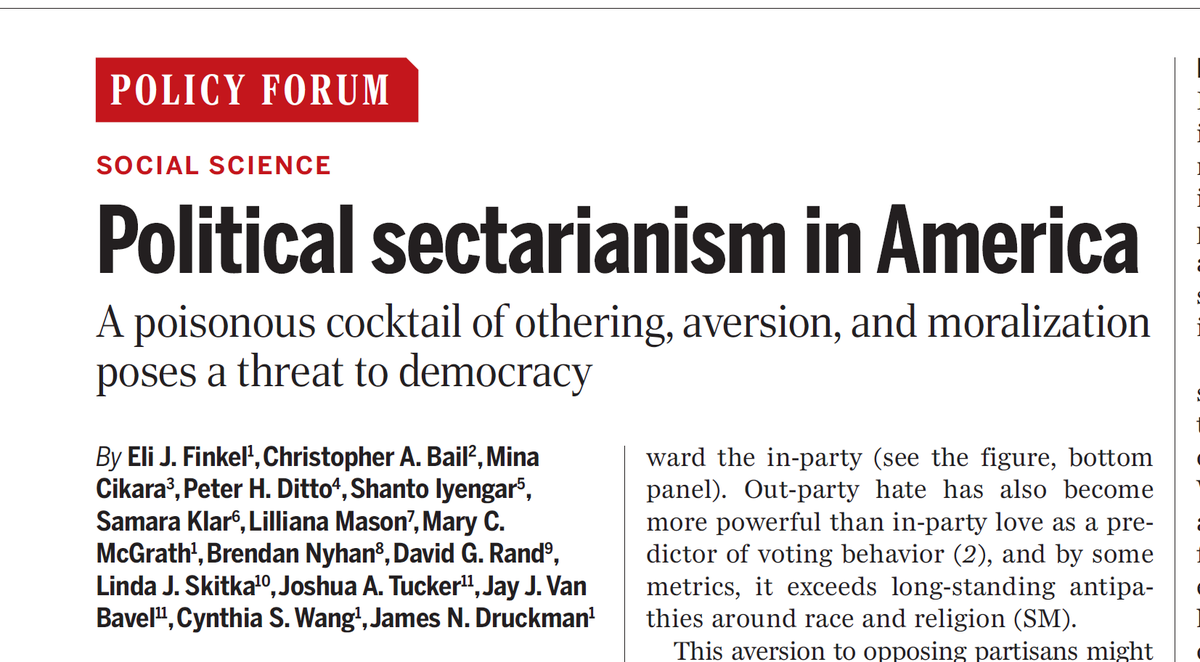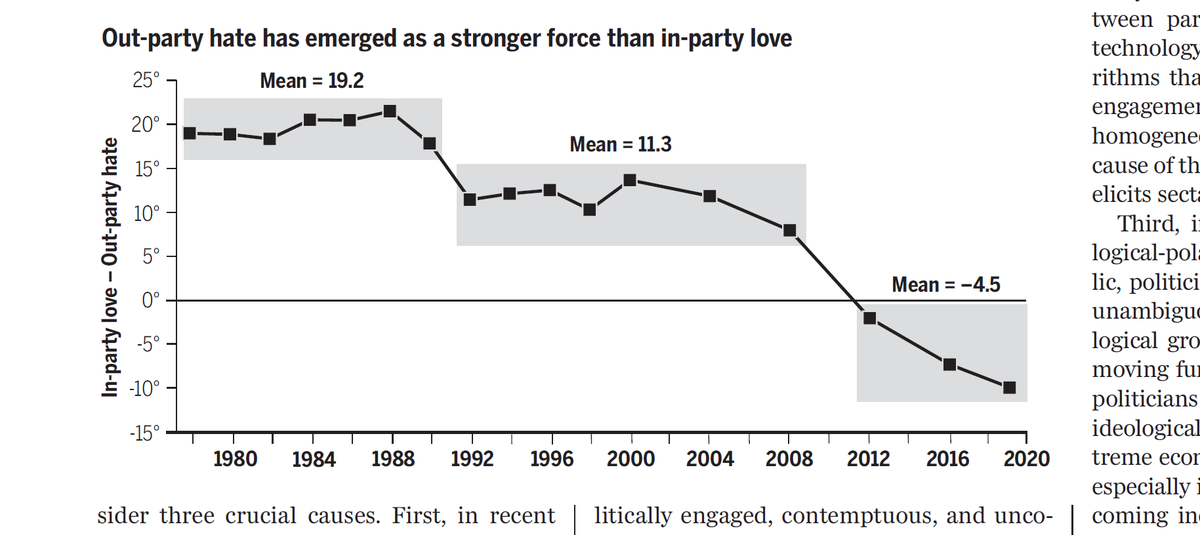1/ I’m excited to announce the publication of “Political Sectarianism in America,” an integrative review article out today in @ScienceMagazine. The author team represents political science, psychology, sociology, economics, and management.
https://science.sciencemag.org/content/370/6516/533">https://science.sciencemag.org/content/3...
https://science.sciencemag.org/content/370/6516/533">https://science.sciencemag.org/content/3...
2/ Jamie Druckman and I led the project, along with @chris_bail, @profcikara, @BizarroPolitix, @saiyengar, @SamaraKlar, @LilyMasonPhD, Mary McGrath, @BrendanNyhan, @DG_Rand, @LindaSkitka, @j_a_tucker, @jayvanbavel, and @CynthiaSCWang.
3/ The paper begins by underscoring that political polarization--divergence between parties regarding political ideas and policy preferences--is not a problem. Citizens can use such divergence as a helpful heuristic for making voting decisions and holding politicians to account.
4/ Political scientists debate whether Democrats and Republicans voters have actually polarized (diverged in terms of ideas and policy preferences) in recent decades. Even so, partisans have grown quasi-religious in terms of their moral fervor against opposing partisans.
5/ They have, that is, become POLITICALLY SECTARIAN -- fervently committed to a political identity characterized by three properties: (1) othering (opposing partisans are alien to us), (2) aversion (they are dislikable & untrustworthy), and (3) moralization (they are iniquitous).
6/ None of these three properties is especially problematic in isolation. But, in combination, they instill a sense of dread -- a sense that political losses are existential threats that must be averted, no matter the cost.
7/ Speaking of aversion, this paper using feeling-thermometer data (0=Cold, 100=Warm) to track “in-party love” and “out-party hate” over time. In the past decade -- and for the first time on record -- disdain for opposing partisans now exceeds affection for copartisans.
8/ We consider 3 reasons why political sectarianism is surging. First, America’s major political parties have sorted in terms of ideological identity (self-identification as “liberal” or “conservative”) & demography (race, religion, sexual orientation, geography, etc.)
9/ Such sorting renders opposing partisans different from, even incomprehensible to, one another. But the problem is exacerbated by “false sectarianism” -- as distinct as Democrats and Republicans actually are today, partisans vastly overestimate such differences.
10/ Second, as Americans have grown more receptive to consuming information slanted through a partisan lens, the media ecosystem has inflamed political sectarianism, especially via talk radio, partisan TV stations/websites, and fury-saturated social-media filter bubbles.
11/ Third, in contrast to the equivocal ideological-polarization trends among the public, politicians have unambiguously polarized recently on ideological grounds, and they use disciplined messaging & moralized rhetoric (“disgraceful,” “shameful”) to sectarianize their followers.
12/ The consequences of political sectarianism are dark. Americans discriminate against opposing partisans, and they are loathe to date/marry across the political divide. They are increasingly willing to support violence or antidemocratic tactics in pursuit of partisan goals.
13/ Sectarianism is also undermining the core government functions of representation and competence. As straight-ticket voting becomes pervasive, politicians feel less desire to represent all of their constituents (e.g., Trump’s willingness to let blue states suffer from Covid).
14/ Meanwhile, gridlock has become a defining feature in Washington. Rather than seeking policies that appeal to large swaths of Americans, politicians pursue maximally partisan policies to demonstrate ideological purity and procure campaign donations.
15/ In a sectarian world, even the decision to wear a mask in a pandemic becomes partisan, pushing toward a disequilibrium in which too few people engage sufficiently in commerce to stimulate economic growth while too few social-distance sufficiently to contain the pandemic.
16/ The result has been lethal and expensive for Americans across the political spectrum.
17/ We propose several possible avenues for mitigating the worse elements of political sectarianism. After the election, we’ll have a better sense of the political landscape. I hope desperately that the nation invest more effort in debating ideas and less in demonizing opponents.

 Read on Twitter
Read on Twitter



